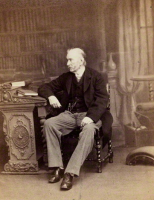










Samuel Hunter Christie (1784 – 1865) was a British scientist and mathematician.
He studied mathematics at Trinity College, Cambridge,where he won the Smith's Prize and was second wrangler. He was particularly interested in magnetism, studying the earth's magnetic field and designing improvements to the magnetic compass. Some of his magnetic research was done in collaboration with Peter Barlow. He became a Fellow of the Royal Society in 1826, delivered their Bakerian Lecture in 1833 and served as their Secretary from 1837 to 1853. In 1833 he published his 'diamond' method, the forerunner of the Wheatstone bridge, in a paper on the magnetic and electrical properties of metals, as a method for comparing the resistances of wires of different thicknesses. However, the method went unrecognised until 1843, when Charles Wheatstone proposed it, in another paper for the Royal Society, for measuring resistance in electrical circuits. Although Wheatstone presented it as Christie's invention, it is his name, rather than Christie's, that is now associated with the device.
Christie taught mathematics at the Royal Military Academy, Woolwich, from 1838 until his retirement in 1854.He died at Twickenham, on 24 January 1865.
A portrait photograph of Christie in 1865 by Ernest Edwards is held by the National Portrait Gallery.
He had ten children (five with each wife), of which eight survived him. His eldest son was the astronomer William Henry Mahoney Christie (1845–1922).
Samuel Christie is the son of one James Christie, although this was almost certainly not the auctioneer James Christie (founder of the great auction house). Instead he was probably the son of a James Christie who in 1821 described himself as a tailor, late of Leicester Square but then of Newman Street, and who died in 1825 aged eighty-six. Because they had the same name, some confusion has arisen between the two James Christie's and many websites incorrectly state that he was the son of the auctioneer. But, as the latter occupied a house in Pall Mall from 1768 until 1803, and died in that year, it seems certain that the James Christie who lived in Leicester Square was not the auctioneer.